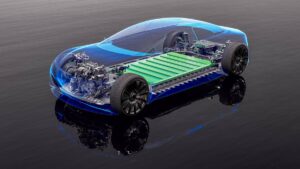Core Lithium already looking at expansion plans after signing Tesla supply deal for Finniss lithium project

Pic: Theo Wargo/Getty Images Entertainment
Another Australian lithium company is joining the stable of Tesla suppliers, with NT developer Core Lithium (ASX:CXO) locking in a binding four-year offtake deal that will ship 110,000t of spodumene concentrate to Elon Musk’s EV giant from 2023.
The news was lapped up by the market, sending $1.6 billion capped Core up ~15% to an all time high of 96c as of 12.30pm AEDT, an astonishing 334% rise over the past 12 months.
Core’s 175,000tpa Finniss mine is due to open in late 2022, the only new hard rock lithium mine in Australia set to launch this year as spodumene and lithium chemical prices continue to head north.
But it is already looking at options to expand to capture the astonishing demand uptick in lithium and EV markets after signing the supply deal with the world’s preeminent electric vehicle producer.
Core has already locked in separate 75,000tpa supply agreements for its first four years of production with China’s Yahua and Ganfeng, with the Tesla deal securing its initial offtake commitments.
“There are expressions all throughout the battery and electric vehicle supply chain from customers and potential customers to supply as much lithium as we can,” Core Lithium managing director Stephen Biggins told Stockhead.
“And so that’s why we are also considering a number of strategies around the project to how we can expand, extend and bring forward production as soon as possible.
“We’re undertaking those studies at the moment but certainly we’ve got every incentive with lithium prices above US$3,000 a tonne for spodumene to be implementing plans to bring forward as much production as possible.”
Tesla deal brings world’s largest EV name to NT
Finniss will be Australia’s first lithium mine outside the mining mecca of WA and the first in the Northern Territory.
Bringing the glitz and glamour of Musk to Darwin, Core also says Tesla will assist it with Stage 3 plans for a potential chemical processing facility near the $89 million mine, which will generate $1.3 billion in revenue over its first 10 years on current planned production rates.
A chemical processing facility could help bring Core and the NT further down the EV supply chain and potentially capture the greater value realisation lithium chemical sales can provide.
Pure lithium carbonate chemicals sell for around 20 times the value of 6% spodumene concentrate at the moment.
The Tesla supply deal is expected to begin in the second half of 2023, linked to prevailing spot prices with floor and ceiling prices.
Biggins said the offtake arrangement was a testament to Core and the Northern Territory’s ability to contribute to the lithium supply chain and decarbonisation efforts and the ‘global significance’ of the Finniss project.
He said downstream customers are keen to lock in supply in a “very, very tight” market.
“The whole of the world’s electric vehicle goals are going to be limited by the amount of lithium and raw materials needed to actually achieve those goals,” he said.
“So new supply like Core is bringing to market later this year is rare, and well sought after by some of the biggest names in the car manufacturing industry.”
High prices sustained as downstream industry hunts supply
A price collapse between 2018 and 2020 threatened to stop the nascent lithium sector in its tracks after a flood of supply overwhelmed a market not yet ready for the coming explosion in EV sales.
Biggins says the landscape in 2022 has been very different as limited supplies and supercharged demand have seen customers offer just about anything for lithium, sending spot concentrate prices beyond US$3000/t.
To provide context on just how quickly the market has turned, Core’s stage 1 DFS in the middle of last year said it would have C1 operating costs of US$364/t at a lithium price of just US$743/t.
“I think you can see by the scale of the investment in downstream, which is now measurable in hundreds of billions of dollars, that the demand side growth is very certain, and to be there consistently to drive and maintain incentive lithium pricing to encourage new lithium supply,” Biggins said.
“What’s changed is that a few years ago, it was about sort of forecast EV sales, whereas now it’s about actual EV sales going through the roof.”
Biggins said carmakers hungry to secure lithium for EV production lines were starting to wake up to the reality that it can take 7-10 years from discovery to build a mining operation.
With that in mind, the pressures driving higher prices could be in place for a while yet.
“I think lithium prices will stay high and for longer, until new supply like Core Lithium really gets into market because at the moment there’s a supply side deficit,” Biggins said.
“So those pressures seem to be in place that are driving higher prices for the foreseeable future.”
Core Lithium share price today:
Tesla on dealmaking spree Down Under
Between his different hats as EV entrepreneur, internet provider, space explorer, tunnel borer and potential father of the robot uprising, Elon Musk is a busy man.
And he’s been busy as hell doing deals and making moves.
His big concern has been securing raw material supplies for Tesla’s booming EV business, which climbed over 1 million car sales in 2021.
If it wants to grow further it’ll need a lot more lithium, nickel, graphite, cobalt and other materials, even with some of its production lines switching to cheaper lithium-iron-phosphate battery chemistries.
There’s an added benefit to Aussie producers.
All of those are produced by companies in Australia or on the ASX.
Musk and Tesla’s Aussie chair Robyn Denholm have increasingly looked Down Under. The latter said last year Tesla would be buying $1 billion worth of raw materials per annum from Australian miners.
In the past 12 months deals by Tesla to hoover up supplies from ASX-listed companies have skyrocketed.
There are some obvious benefits, particularly for small producers, in supplying a recognised brand considered a market leader.
Musk’s own notoriety doesn’t hurt, promising a bump in your share price and publicity a junior company may not receive if it was supplying, say, China’s BYD (cf. this article).
Tesla’s recent Aussie deals
The big one which opened the floodgates was Tesla’s deal with BHP (ASX:BHP) and its Nickel West division.
With BHP completing the construction of a long delayed nickel sulphate plant in Kwinana last year, the supply deal provided Tesla access to a rare source of the battery grade nickel material outside China, partnering with BHP to monitor its supply chain to improve the ESG metrics of its battery products.
BHP has since invested heavily in EVs and solar power at its Nickel West business to strengthen those investing parameters. The deal will indirectly make several Australian nickel miners who supply ore or concentrate to BHP including Mincor (ASX:MCR), IGO (ASX:IGO) and Western Areas (ASX:WSA) Tesla suppliers too.
Liontown Resources (ASX:LTR) is another lithium company that nabbed a supply deal with Tesla last month, building a platform for the development of its $473 million Kathleen Valley mine in WA’s Goldfields.
From 2024, Tesla will purchase 100,000 dry metric tonnes of spodumene concentrate in the first year, increasing to 150,000dmt per year for the remaining four years of the five-year term, representing around a third of its stage 1 output.
It is not the only lithium supply deal Tesla has secured with an Aussie co. Piedmont Lithium (ASX:PLL) got Musk on board with its North Carolina project in the USA in 2020, promising a source of supply close to Tesla’s home base.
Changing speeds and Syrah Resources (ASX:SYR), one of many graphite miners to reimagine itself as a downstream graphite active anode materials play, has Tesla on board as a customer for its Vidalia plant in Louisiana.
It plans to be the only commercial scale producer of graphite battery anode material located in the superpower economy.
The original announcement of the Tesla deal was light on info but after a brief consultation last year with the ASX, Syrah offered a few more nitty gritty details on the Tesla arrangement.
Syrah, which also owns the Balama graphite mine in Mozambique, will send around 8000t a year to Musk, conditional on final specifications of the AAM product being provided by the end of this year.
The total estimated capital costs of the Vidalia initial expansion approved last month by Syrah’s board will come in at US$176 million, after it raised $250 million to bankroll the 11,250tpa plant.
Syrah says demand for the material is so strong it is already studying a second stage expansion to 45,000tpa.
Tesla suppliers share price today:

UNLOCK INSIGHTS
Discover the untold stories of emerging ASX stocks.
Daily news and expert analysis, it's free to subscribe.
By proceeding, you confirm you understand that we handle personal information in accordance with our Privacy Policy.








